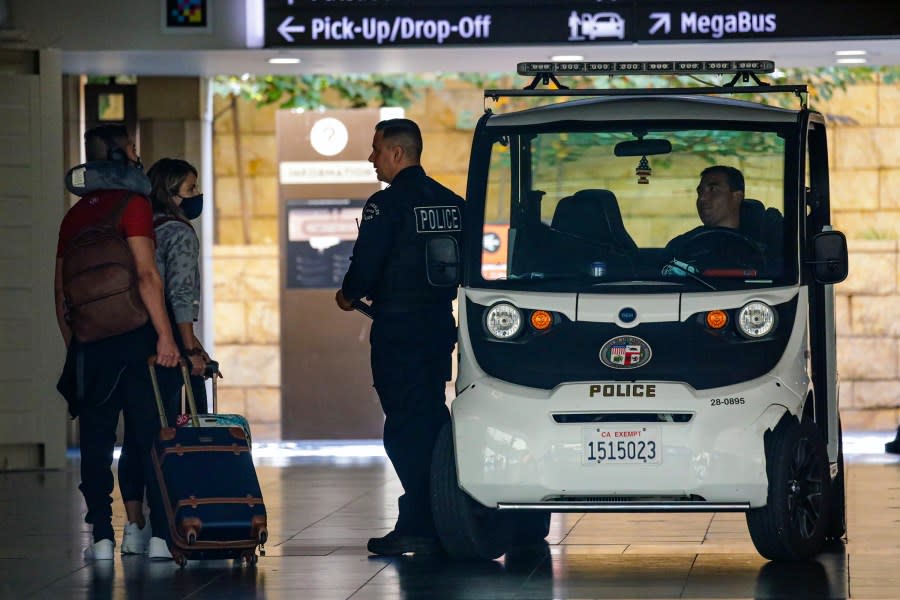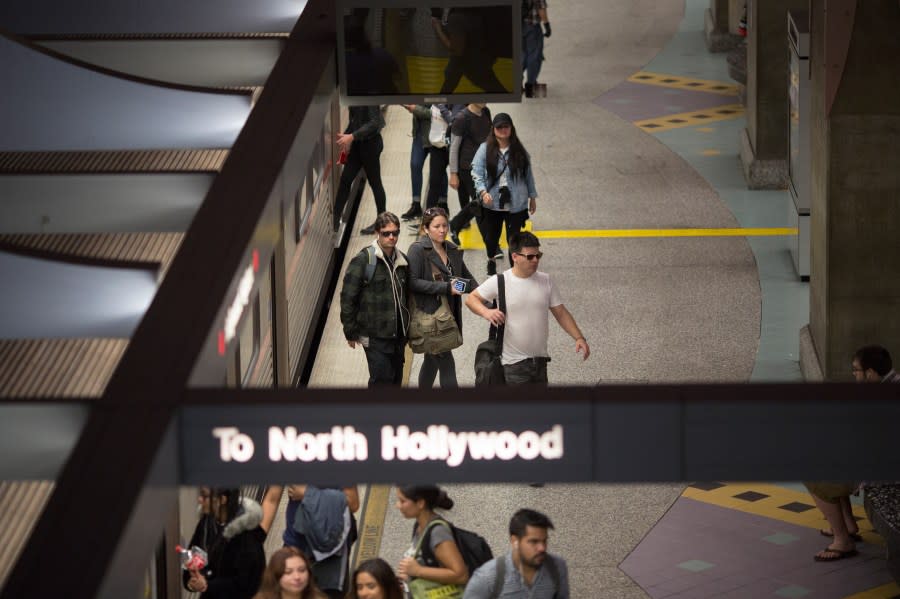Lack of law enforcement presence criticized by Metro leaders
- Oops!Something went wrong.Please try again later.
Board members of the Los Angeles County Metropolitan Transportation Authority held a press conference Thursday morning to discuss a rash of high-profile crimes across the Metro bus and train lines and announce plans to increase law enforcement presence throughout the system.
The board, which is comprised of local elected officials including Los Angeles Mayor Karen Bass and the Los Angeles County Board of Supervisors, were critical of the presence — or lack thereof — of law enforcement personnel contracted to provide safety resources to riders.
“Let me begin by being absolutely unequivocally clear: the spike in violent crime on Metro that we have recently seen against operators and riders has been absolutely unacceptable,” Bass said. “And I know that all of my colleagues here today would agree.”
Bass, who serves as chair of the Metro board, said she directed an “immediate surge” of law enforcement personnel on Metro buses, trains and station to address the concerns of drivers and passengers.
Metro contracts its law enforcement service to the Los Angeles Police Department, Los Angeles County Sheriff’s Department and the Long Beach Police Department. The value of those contracts total more than $150 million.
But a lack of police visibility in stations and aboard vehicles has drawn criticism from riders, bus drivers and members of the Metro Board.
Men disrupt Los Angeles Metro service by climbing on top of train
Fourth District Supervisor Janice Hahn was among the most critical regarding law enforcement’s absence across the Metro system.
She said all the effort being put in to improve the system, expand its reach and decrease headways means nothing if those who use Metro do not feel safe — and that begins with officers being easy to find and quick to respond.
“They are essential to keeping our riders safe. But for too long, these contracts have not gotten us a readily visible law enforcement presence on our system,” Hahn said. “We need law enforcement riding our buses and our trains. It does not do our riders any good if officers remain in their squad cars.”
A 2023 audit from the Office of the Inspector General found that many of the law enforcement officers tasked with patrolling transit stations, trains and buses spent the vast majority of their time away from those areas and instead spent most of their time in their vehicles. That audit also found that more than half of transit-related 911 calls received responses from officers not assigned to the Metro system.
The motion discussed Thursday lists five directives for Metro CEO Stephanie Wiggins to address these issues, including increasing the number of public safety personnel deployed across Metro every day and directing contracted law enforcement officers to be more proactive and spend more time being “physically present” on trains and buses. Metro also wants officers to better stagger their schedules and shifts to avoid lapses in coverage.
The Board also wants Metro to establish a “unified command” comprised of the contracted law enforcement partners working together under the direction of the Metro System Security and Law Enforcement Department.
Los Angeles Metro board member says she’s ‘afraid,’ will not ride alone
Cellular reception and Wi-Fi coverage was another area of concern for Metro leaders. Service can be spotty in the underground stations and tunnels, making it difficult for those needing help to contact law enforcement and rendering its Metro Transit Watch safety reporting app essentially ineffective.
“The only thing worse than finding yourself in an emergency situation is not being able to call for help,” said board member and Los Angeles City Councilmember Katy Yaroslavsky. “In 2024, there is no reason this should be an issue and yet we know there are dead zones in our system. We have a responsibility to fix this issue as quickly as possible.”
Metro will work to ensure that service is enabled and working throughout the system, as well as increase efforts to inform the public about the Transit Watch app, the motion reads.
Bass stressed that overall crime across the Metro system is down compared to years past and ridership has been steadily increasing to pre-pandemic totals. But violent crimes are what leave the public feeling the most ill at ease and the attacks over the past several weeks need to be addressed.
“When you have a spike, you respond aggressively to that spike, and that’s what we’re doing today,” Bass said.
The motion will be introduced and voted on during the Metro board’s regularly scheduled meeting next week.
Copyright 2024 Nexstar Media, Inc. All rights reserved. This material may not be published, broadcast, rewritten, or redistributed.
For the latest news, weather, sports, and streaming video, head to KTLA.



